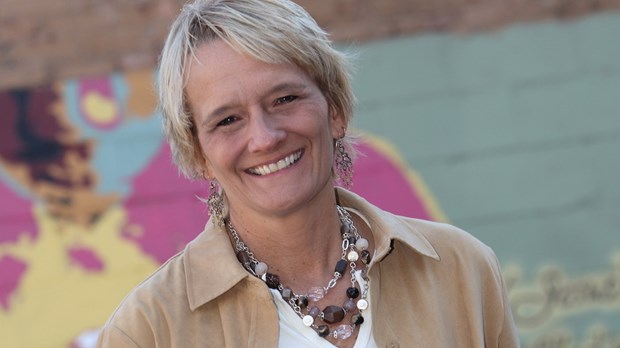Breaking Through Together

Arloa Sutter lives and works in a neighborhood called East Garfield Park located on the west side of Chicago, Illinois. It’s a neighborhood filled with wide boulevards, tree-lined streets, and beautiful public parks. The neighborhood is home to the Garfield Park Conservatory, one of the largest conservatories in America, and lies only ten minutes from downtown Chicago. Yet, for all of its beauty, the neighborhood has some challenges too.
East Garfield Park has struggled for decades with the effects of disinvestment. Families must leave the neighborhood to find healthy produce options. Most public grammar schools are underperforming, surviving on far fewer resources than their suburban counterparts. Despite the gorgeous brick homes, vacant lots dot the landscape. There is a noticeable absence of job opportunities in the neighborhood, and this has been the case for decades. As all of these challenges coalesce, frustrations run deep and the potential for violence seems ever present. Arloa recounts that shortly after moving into the neighborhood a bullet passed through her living room window and lodged in her dining room wall. She easily connects this event to the systemic issues that have burdened the community. “This is what happens when kids lose hope in education and take their futures into their own hands,” she concludes. Despite the convergence of these difficulties, Arloa is not ready to surrender.
Rising to the Challenge
Arloa is the Executive Director for Breakthrough Urban Ministries, a community development agency that is determined to weave together the collective efforts of neighbors to create change for families in East Garfield Park. They have chosen to focus on the nearest 32 blocks and saturate the community with support.
Breakthrough facilitates two transitional shelters, one for men and one for women. They run an after-school program for kids in the neighborhood and a client-choice food pantry for families. They even have a home delivery service for seniors who find it difficult to come to the pantry. Breakthrough also offers computer training, financial literacy workshops, and employment readiness classes.
Though she beams with pride as she lists the ministries of Breakthrough, Arloa is quick to share that this ministry had small beginnings. “It was a grassroots endeavor that started it all. We kept asking ourselves, How could God use us to care for the inebriated and homeless? Until then the great debate was always over whether or not to give the homeless our pocket change. We knew there had to be more we could do.
“At the time our church had unused storefront property. We took it over, cleaned it up, turned on a pot of coffee, and opened our doors. As we established relationships with our visitors and heard their stories, we felt God calling us to take another step. That’s when we partnered with the city to add an overnight shelter for men. God kept calling us deeper. We knew that we needed an overnight shelter for women too. That’s what brought us to East Garfield Park. There we found two buildings we could renovate for both shelters, and Breakthrough Urban Ministries has been rooted in the community ever since.”
Even with all of these services, Breakthrough is still growing. In January the community celebrated the grand opening of Breakthrough’s newest endeavor, the FamilyPlex. This new building expands their youth development ministries, containing more classrooms for mentorship and tutoring, enlarging the preschool, and housing an athletic gym and health center. They are even partnering with Lawndale Christian Health Center, another prominent nonprofit in the area, to operate a ten-room exam clinic.
“This is a place where our community will be able to come alongside children, from preschool through high school,” says Arloa. She is passionate about early childhood education and the importance of supporting children through their entire elementary education. She continues, “We must be vigilant in showing kids the value of education at every step in their schooling. We know the streets are not a viable option for our youth. The new FamilyPlex will give us the safe space we need to let the community express its support for our kids.”
Partnering with the Community
Walk through the halls of Breakthrough and you will notice a buzz. Every room is filled with visitors and volunteers catching up on life, strategizing logistics, or trying out a new skill.
Who are these volunteers? Many of them have witnessed the difference Breakthrough Urban Ministries is making in the community. Some volunteers have needed the services of Breakthrough in the past and are now committed to offering hope to others. “From the beginning we wanted to partner with the residents of East Garfield Park, to serve alongside them as neighbors,” Arloa tells us. When Arloa uses the word neighbor, she isn’t kidding. Not only does Arloa live in the community but so does 60 percent of her staff and many of the volunteers. Arloa smiles as she adds, “When I see how many staff and volunteers are neighbors with those we serve it lets me know that our mission is working.”
Though Arloa has chosen to focus her efforts in the city, she is quick to remind us that no matter where you live—city, suburbs, or rural countryside—the poor are never far from you. Arloa hopes that Christians who feel called to community development will find Breakthrough’s model scalable and replicable. “Perhaps you won’t start with a 32-block radius, but maybe you can begin with 4 or 5 blocks,” suggests Arloa. “I just want to combat the idea that poverty is a black hole from which no one can escape. Turn on the TV and we are inundated with the latest crime statistics, the failures of our schools, the poor health of our communities, and it’s easy to get overwhelmed. But we can’t lose hope! There are effective community development strategies that are reducing poverty and changing lives.”
Urban-Suburban Connections
Arloa adds that partnership between city and suburban ministries has been important to Breakthrough. She has no trouble listing examples: “Women have organized toy drives for our annual Christmas store, led sewing classes, and introduced culinary arts to our community. Men have started film clubs, robotics classes, and athletic events. Small groups come to Breakthrough faithfully to help serve meals and welcome newcomers to our space.”
Pay attention to all the tours happening at Breakthrough, and you’ll quickly find the partnership is not just one direction. “Often, our ministry is able to help suburban ministries who are starting new services or expanding existing services to meet ever-increasing needs of families outside the city limits. We can help one another,” says Arloa. “We can learn from one another and be true partners in combating poverty.”
Delighting in Miracles
Due to the presence of Breakthrough Urban Ministries in the community, changes are occurring. Each year Breakthrough provides 70,000 meals for people experiencing homelessness; gives 1,100 families groceries from their Fresh Market pantry; and offers youth development activities to more than 500 children.
Even with these staggering numbers, it is still the small miracles that Arloa continues to delight in. Once a gentleman came to Breakthrough seeking a black suit for a new job, right as a woman arrived with a full suit in her trunk, a donation from her husband. Another time a woman learning to sew ran out of supplies. Just as she was making the staff aware of this need, a truck pulled up full of sewing materials! Even Arloa has been surprised by God’s provision. “I remember a gentleman came to Breakthrough in the middle of winter in need of a coat. I went to check our donation closet but found nothing that was large enough. Disappointed, I turned to tell the gentlemen we couldn’t help him today. Before I could do so, I bumped into someone who wanted to donate a down coat in the perfect size!”
In her book, The Invisible, Arloa devotes an entire chapter (called “The Breakthrough of Being Spirit Led”) to these small but impactful miracles. After 21 years of ministry, these are the moments that Arloa holds close to her heart. “They serve as a constant reminder that when you’re near the poor, you’re near God,” she says. There is a theme in each of these stories, and Arloa is quick to call our attention to it: “No matter how dire or hopeless the situation seems, I am reminded that God knew the needs of each person long before I did. God asked specific people to act, and when they obeyed, a need was met. It’s a rush to experience an intimate, personal God who meets the poor and acts on their behalf.”
Austin Channing Brown is a TCW regular contributor. A resident director and multicultural liaison at Calvin College, Austin is passionate about racial reconciliation—and has a slight obsession with books. When she’s not reading, you’ll find Austin watching HGTV or updating her blog AustinChanning.com.
Read more articles that highlight writing by Christian women at ChristianityToday.com/Women
 Read These Next
Read These Next


 Book review: 'Seven'One woman's journey to find God's desire for her life and stewardship
Book review: 'Seven'One woman's journey to find God's desire for her life and stewardship
 Why Doesn't God Answer My Prayers?After three of my children died, my views on prayer drastically changed.
Why Doesn't God Answer My Prayers?After three of my children died, my views on prayer drastically changed.








 Homepage
Homepage
